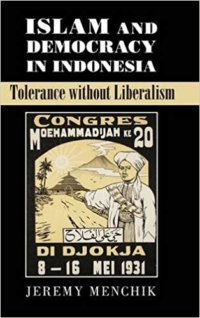Islam and Democracy in Indonesia: Tolerance Without Liberalism

Islam and Democracy in Indonesia: Tolerance Without Liberalism. Jeremy Menchik. Cambridge: Cambridge University Press, 2016.
Islam and Democracy explains Indonesian Islamic organizations’ vision for tolerance without liberalism, a philosophy that is viewed with suspicion in this country because of its association with Christian proselytizing and western imperialism. Furthermore, Indonesians simply do not want to sanitize their public square of religion. Religion is central to Indonesian politics rather than relegated to the private sphere as in the West.
The primary goals of the book are to explain how Indonesians understand tolerance, why they understand this way, and to develop non-European theories and concepts of tolerance and nationalism to better understand non-European countries. The book is a culmination of two years of field research, in addition to the mastering the scholarly literature on the subject. It is a thought-provoking and successful study that examines the interaction between religion and politics in the world’s largest Muslim-majority democracy.
The book consists of seven chapters, with the first situating Menchik’s study in the political science and theory literature on religion and politics. The second chapter presents the theoretical and methodological tools that Menchik employs to explain the varying levels of tolerance in Islamic organizations. These organizations develop their understanding of toleration through locally generated social interactions: the ethnic composition of the organization, the interactions during the organization’s formation, and the relationship between the group and the state.
From this analysis, Menchik provides a continuum of tolerance that examines both behavior and discourse of actors. On one end is full intolerance where actors actively persecute minorities and are vocal in their denouncement; on the other end is full tolerance where actor actively opposes any restrictions on the behavior of minorities and are vocally supported. In between are semi-intolerance (a strict hierarchy is maintained and minorities are denounced but no action is urged against them), semi-tolerance (a distinct religious identity is supported and spoken of in terms of difference but not pejoratively), and neutrality (no interaction and discussion of minorities).
The third chapter uses archival and survey data in Central, West, and East Java to show that western theories of culture, religion, and decision-making fail to account the attitudes of Indonesian Muslims to non-Muslims. In the early twentieth century, Muslim organizations fought against both Christian missionaries and rival Islamic groups which shaped the development of a national consciousness and institutions that still organize political life today. When Christians engaged in aggressive proselytizing and sharp polemics against Islam, Muslim leaders developed polemical responses and avoided interactions with Christians. But in areas where Christians and Muslims shared the same ethnicity, threats and polemics were diminished. Local politics and social cleavages established during the period of an organization’s formation consequently can explain contemporary attitudes and policies towards Christians.
Explaining why Islamic organizations are willing to accommodate some minorities but not others is the focus of chapter four. For example, having different reasons for disliking the heterodox Muslim sect, Ahmadiyah, Indonesian Islamic organizations all agree to exclude them, thereby creating a feeling of nationalism among themselves. Thus, Indonesian nationalism is modern, plural, and rooted in theological rather than geographic or religious exclusion. Menchik calls this concept, “godly nationalism” to provide a template to understand the relationship between religion and nationalism when religion is part of the public square.
Chapter five looks at the coevolution of the state and religion by focusing on three moments of differing practices of tolerance. First, the entry of the Masyumi political party into government increased tolerance towards Christians before and after the democratic elections of 1955. Second, the Ministry of Religious Affairs worked with Balinese Hindus in 1953-64 to mold their religion into a form of monotheism that would be recognized and tolerated by Muslim organizations. Third, the abandonment of communists by Muslim organizations in the mid-1960s led to intolerance towards the communists, including active support for the mass killings of 1965-66.
The penultimate chapter synthesizes the previous arguments to present a complete and contemporary picture of Islamic organizations’ attitudes towards Christians, Hindus, communists, and Ahmadiyah and how structural factors shaped the attitudes towards each group. Islamic organizations are tolerant of these minorities based on group rights, legal pluralism, the separation of religious and social affairs, and the primary of religious values over other values; or what Menchik coins “communal tolerance.” This understanding of tolerance is different from Locke’s or Rawls with the community and religion playing critical roles in the public square. This new understanding of tolerance is critical for those who are trying to reconcile Islam with democracy. Rather than trying to address this question, Menchik argues that scholars should be asking what kind of democracy do Muslims want?
The final chapter reiterates Menchik’s concepts of “godly nationalism” and “communal tolerance” that makes Indonesia democratic and tolerant. These concepts also could be adopted elsewhere to better understand Muslim societies. By making religious organizations and their virtues at the center of analysis, scholars can better understand social movements, political theory, and the world’s “multiple modernities.” Such scholarship would truly be comparative and could be the building blocks for a useful and genuine comparative political theory and science.
Islam and Democracy in Indonesia is a model of how political theory and science should be done with an engagement of the scholarly literature while, at the same time, being methodological diverse and empirically grounded. Menchik’s book does a remarkable service by showing that, as the world becomes smaller from globalization, the West needs to learn that its theories, values, and methodologies are not universally suited for all countries, including its concept of tolerance. For the non-western world, countries can be both democratic and tolerant without be liberal – a valuable lesson for the West if it wishes to remain its primacy in this new age of globalization.




